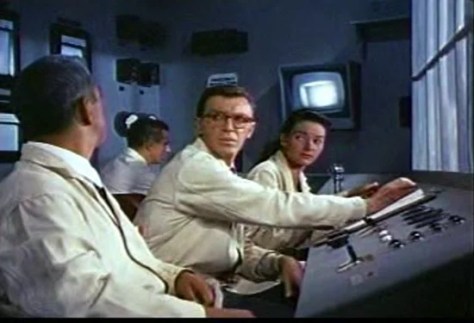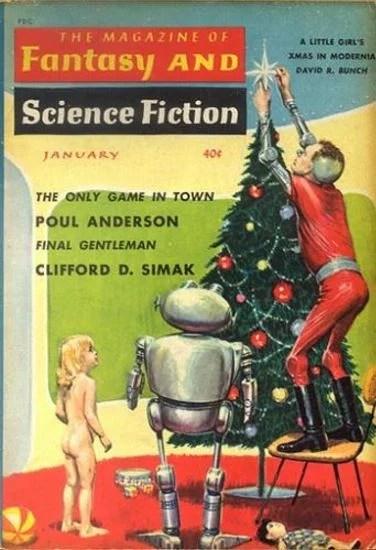
I've finally finished the January 1960 IF and can report fully on its contents. January has been a decidedly uninspiring month for digests. They're all in the 3-star range (though for Astounding, that's actually a good month!) with no knockouts in the bunch. Perhaps this is the calm before the storm.
The reliable if stolid Mack Reynolds (writing as Mark Mallory) kicks off this issue with The Good Seed. Can a man trapped on a tiny island by a swelling tide escape before he is drowned? Perhaps with the help of a sentient, telepathic plant. It's actually quite a touching story.
James Stamers seems to be a newcomer, and it shows in his unpolished writing. Despite this, his The Divers, about psionic neutrals (essentially anti-telepaths) with the ability to astrally project, has some fascinating ideas and some genuinely evocative scenes. Had Stamers given the tale to Sturgeon to work over for a final edit, I think it could have been an epic. As it is, the story suggests that its author is a diamond in the rough waiting to be polished.
Two Ulsterians, Bob Shaw and Walt Willis, wrote the short Dissolute Diplomat, about an unsavory space traveler who crashes on an alien world, bullies the jelly-ish inhabitants into fixing his ship, and then gets what he deserves in a groan-worthy fashion that is truly pun-ishing.
The Little Red Bag, by Jerry Sohl, is a good piece of thrilling writing, at least until the somewhat callous and abrupt end. A fellow on a plane has the power of tactile clairvoyance—and he discovers a ticking time bomb in the luggage compartment. Can he save the passengers before it goes off? Having flown the route that the plane takes many times (Southerly down California into Los Angeles), the setting is quite familiar, which is always fun.
Daniel Galouye (how do you pronounce his name?) is up next with the interesting teleportation yarn, The Last Leap. Three military subjects have gone AWOL after artificially gaining the ability to materialize anywhere. Surely they were not killed–after all, even the vacuum of space poses no danger, for the 'porters reflexively snap back to a safe spot; moreover, they instinctively avoid teleporting into solid objects. What could have happened? You find out in the end…
To Each His Own, by Jack Sharkey, stars a team of Venusians who explore the Earth after a recent holocaust. The nature of said disaster is never made explicit until the very end, though it is alluded to subtly. I confess that I should have figured out the gimmick ending, but I didn't. I suppose that constitutes a point in the author's favor.
Margaret St. Clair has a fun story (The Autumn after Next) about a magical missionary whose job is to convert magic-less cultures into adepts at the Arts. He meets his match, and his end, attempting to introduce the most reluctant of tribes to the supernatural. Better than The Scarlet Hexapod, not as good as Discipline, both IF stories.
Finally, we have Cultural Exchange by J.F. Bone wherein a crew of space explorers meets a sophisticated alien race with both superior and inferior technologies. It is a first contact story of Cat and Mouse with both sides attempting to be the predator. Not stellar, but satisfying.
That's that! It's an unremarkable issue, slightly under the standards of its older sibling, Galaxy, I'd say. Worth a read, but you won't remember it next month (unless, of course, you review my column).
Note: If you like this column, consider sharing it by whatever media you frequent most. I love the company, and I imagine your friends share your excellent taste!
P.S. Galactic Journey is now a proud member of a constellation of interesting columns. While you're waiting for me to publish my next article, why not give one of them a read!
(Confused? Click here for an explanation as to what's really going on)
This entry was originally posted at Dreamwidth, where it has comments. Please comment here or there.











